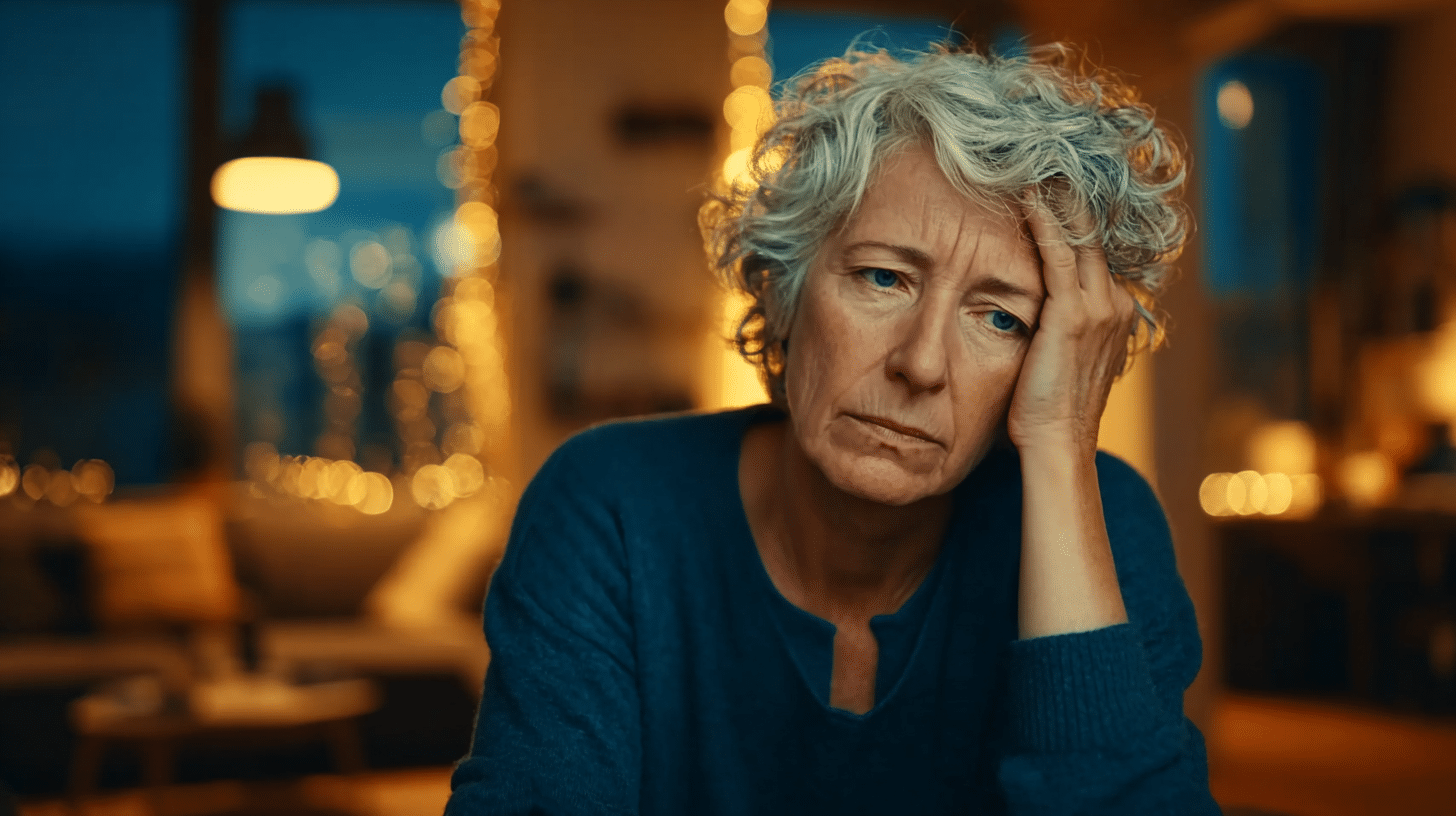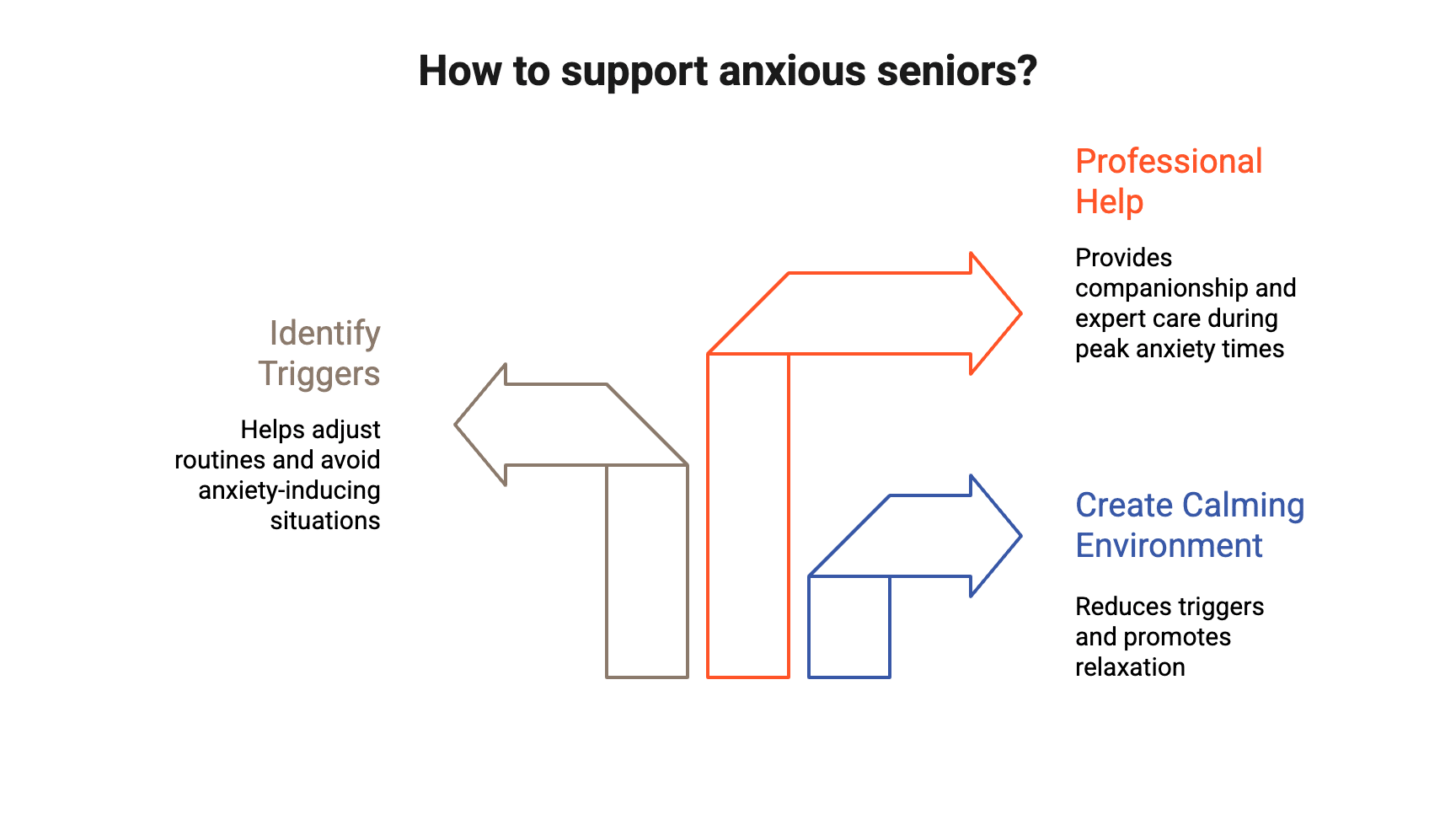Why Anxiety Gets Worse at Night as We Age (And What Helps)
Elderly anxiety at night is more common than many realize. If you’re an older adult lying awake with racing thoughts, or caring for an aging parent who grows anxious as evening approaches, you’re not alone. Anxiety is common among elderly individuals, affecting up to 20% of the older population, often going undiagnosed, and nighttime often amplifies these feelings with particular intensity.
Understanding why anxiety symptoms intensify after dark—and knowing what helps—can make a significant difference in well-being for older adults and loved ones.
Why Does Anxiety Hit Harder at Night for Older Adults?
Nighttime anxiety in seniors stems from real physical and psychological changes. Several factors converge in the evening to amplify anxious feelings. Generalized Anxiety Disorder (GAD) is believed to be the most common anxiety disorder among older adults, further contributing to these challenges.
As we age, circadian rhythms naturally shift. Many seniors tire earlier but wake frequently throughout the night. These disrupted sleep cycles trigger or worsen anxiety symptoms, creating a cycle where worry prevents sleep and poor sleep fuels more worry.
Brain chemistry changes also play a role. Alterations in neurotransmitters that regulate mood and stress responses combine with the quiet and solitude of nighttime to make fear and excessive worry feel overwhelming.
Chronic health conditions add another layer. Heart disease, sleep apnea, or pain can peak at night. Medications may increase restlessness or agitation. Even a urinary tract infection—common in older patients—can show up as confusion or anxiety during evening hours.
The Role of Cognitive Decline and Dementia
For seniors experiencing cognitive decline or dementia, nighttime brings unique challenges. Sundown syndrome describes a pattern where confusion, anxiety, and behavior changes worsen in late afternoon and evening. While the exact cause remains unclear, reduced light exposure and fatigue likely contribute. Sundowning is not a disease but a symptom of dementia, often exacerbated by these environmental and physical factors.
Sundown syndrome differs from generalized anxiety disorder, though both cause distress at night. Cognitively impaired individuals may experience increased shadows and diminished visual cues that heighten disorientation.
Those with Alzheimer’s disease face a greater risk of sundowning behaviors, which can include severe anxiety, aggression, and emotional outbursts.
What Are the Warning Signs of Nighttime Anxiety in Seniors?
Recognizing symptoms of anxiety in older adults isn’t always straightforward. Many seniors grew up less comfortable discussing mental health and may not label their feelings as “anxiety.”
Physical symptoms often appear first. Heart palpitations, rapid breathing, restlessness, and trouble sleeping are common signs. Some experience digestive upset or muscle tension that worsens as the sun goes down.
Emotional and behavioral changes matter too. Watch for:
- Excessive worry about health, finances, or safety intensifying in the evening
- Irritability or agitation absent earlier in the day
- Difficulty concentrating or making decisions after dinner
- Social withdrawal or reluctance to be alone at night
- Repetitive questions or requests for reassurance
For aging parents with dementia, sundown syndrome symptoms may include confusion about time or place, suspiciousness toward caregivers, or attempts to leave home in the evening.
How Can Older Adults Reduce Anxiety at Night?
The good news: non-medication approaches work for managing anxiety disorders in seniors. These strategies target root causes without medication risks.
Cognitive Behavioral Therapy for Late-Life Anxiety
Cognitive behavioral therapy (CBT) stands out as one of the most effective treatments for anxiety disorders in older adults. CBT helps identify thought patterns that fuel worry and teaches skills to challenge them. Practicing mindfulness and meditation techniques can also reduce anxiety in seniors, complementing CBT’s benefits.
In therapy sessions, you’ll recognize when anxious thoughts spiral and develop techniques to redirect them. For nighttime anxiety specifically, CBT addresses beliefs like “something bad will happen if I don’t stay vigilant” or “I won’t cope with an emergency alone.”
Research consistently shows CBT reduces both anxiety symptoms and sleep problems in older patients—often with lasting benefits extending beyond the therapy period.
Sleep Hygiene and Routine
A consistent bedtime routine signals your body to wind down. This matters especially for seniors whose sleep cycle has become irregular.
Effective sleep hygiene strategies include: Establishing a predictable schedule for meals and bedtime can help seniors reduce anxiety, as consistency supports both mental health and sleep quality.
- Going to bed and waking at the same time daily, even weekends
- Limiting caffeine after lunch and avoiding alcohol in the evening
- Keeping your bedroom cool, dark, and quiet
- Reducing daytime napping to 20-30 minutes maximum
- Getting natural light exposure earlier to support circadian rhythms
For seniors with sundown syndrome, maintaining structure throughout the day becomes critical. Regular meal times, scheduled activities, and limiting overstimulation in late afternoon can reduce evening agitation.
Deep Breathing and Relaxation Techniques
When anxiety strikes at night, practicing mindfulness and relaxation exercises provides immediate relief without side effects. Deep breathing activates your body’s natural calming response, slowing heart rate and reducing physical tension.
Try this breathing exercise: Inhale slowly through your nose for a count of four, hold your breath for four counts, then exhale gently through your mouth for six counts. Repeat this cycle for several minutes to promote calmness.
Progressive muscle relaxation—tensing and releasing muscle groups from toes to head—also helps. These practices work especially well when built into your evening routine before anxiety peaks.
Staying Active and Connected
Regular physical activity during daylight improves both mental health and sleep quality in seniors. You don’t need intense workouts—engaging in regular physical activity can alleviate anxiety in seniors and offers substantial benefits for emotional well-being.
Social connections buffer against anxiety and depression in the golden years. Isolation feeds worry, while maintaining relationships with family, friends, or community groups provides emotional support and distraction from anxious thoughts.
Even phone calls or video chats make a meaningful difference.
When Should Older Adults Consider Medication for Anxiety?
Most anxiety and sleep problems in older adults respond well to therapy and lifestyle changes alone. However, severe anxiety interfering with daily functioning may warrant medication as part of treatment.
Common anti-anxiety medications carry serious risks for seniors. Benzodiazepines like lorazepam or temazepam can cause confusion, falls, memory problems, and increased dementia risk. These medications are avoided in older patients due to these dangers.
If medication becomes necessary, safer options may include:
- Certain antidepressants at low dose, which address both anxiety and depression
- Buspirone, an anti-anxiety medication with fewer side effects
- Targeted treatment for underlying conditions contributing to anxiety
Never start, stop, or adjust medications without guidance from your healthcare provider. What works for younger adults may not suit seniors, and drug interactions with other medications become more likely with age.
How Can Family Members Support Anxious Seniors?
If you’re caring for an aging parent or elderly loved one experiencing nighttime anxiety, your professional support matters enormously.
Create a calming environment in evening hours. Reduce noise, maintain adequate lighting to prevent shadows (which trigger fear in those with dementia), and minimize stressful events or discussions before bed.
Identify triggers that worsen anxiety. Does your loved one grow agitated after watching the news? Do certain topics lead to excessive worry? Recognizing these patterns helps you adjust.
For seniors with sundown syndrome, consider:
- Scheduling important activities and appointments for morning or early afternoon
- Avoiding large meals late in the day
- Limiting visitors in the evening when overstimulation becomes problematic
- Using nightlights to reduce disorientation
Here’s why professional help matters: Home care services can provide companionship during evening hours when anxiety peaks. A trained caregiver offers reassurance, helps maintain routines, and gives family members vital respite care. This professional support becomes essential when anxiety disorders interfere with daily life.
Geriatric psychiatry specialists understand the unique presentation of anxiety disorders in older adults. They guide treatment decisions that account for multiple chronic health conditions and medications.
What Makes Nighttime Anxiety Different in Younger Adults vs. Seniors?
While anxiety affects all ages, the experience and treatment differ for older adults in important ways.
Younger adults with anxiety often describe racing thoughts about work, relationships, or future uncertainties. Seniors more commonly worry about health decline, losing independence, becoming a burden on family, or finances on a fixed income.
The physical experience also shifts with age. Older adults may attribute anxiety symptoms to aging or medical conditions rather than recognizing them as signs of an anxiety disorder. This delays diagnosis and treatment.
Social anxiety and fear of falling can limit seniors’ willingness to leave home or engage in activities, creating isolation that worsens both anxiety and depression. The stakes climb higher—what starts as worry can cascade into functional decline and loss of independence.
How Do You Deal with Nighttime Anxiety?
You don’t need to manage nighttime anxiety alone. Reach out for professional help if anxiety interferes with sleep most nights, limits daily activities, or causes significant distress.
Seek help promptly if you notice:
- Sudden onset of anxiety in someone without previous symptoms (could signal a medical issue)
- Thoughts of self-harm or feeling life isn’t worth living
- Inability to complete normal activities due to fear or worry
- Anxiety persisting despite trying self-help strategies for several weeks
In simple terms: Stressful events like losing a spouse or receiving a new diagnosis are a natural response to difficult circumstances. Professional support helps you process grief and adjust to life changes in healthy ways. This isn’t weakness—it’s a normal part of maintaining well being in later life.
Remember that treatment works to relieve anxiety in older adults. With the right support, seniors can reduce symptoms, improve sleep, and enjoy greater peace of mind during their golden years.
Reach out to us for assistance
If you’re in the DC area and looking for support with anxiety or sleep problems, the therapists at Therapy Group of DC understand the unique challenges facing older adults and their families. Our practice in Dupont Circle offers evidence-based therapy to help you or your loved ones find relief. Schedule an appointment to get started.
Frequently Asked Questions About Elderly Anxiety at Night
What causes elderly anxiety at night to occur more frequently?
Elderly anxiety at night can occur due to a combination of factors including changes in brain chemistry, disrupted circadian rhythms, chronic health conditions like sleep apnea, and environmental triggers such as diminished light exposure. These factors often amplify anxiety symptoms in older adults during evening hours.
How can exposure therapy help seniors with anxiety disorders?
Exposure therapy is a cognitive behavioral technique that gradually helps seniors face and reduce fear or anxiety related to specific triggers. By safely confronting these fears in a controlled setting, older adults can decrease avoidance behaviors and improve emotional well-being.
What role does the American Association play in managing elderly anxiety?
The American Association for Geriatric Psychiatry provides guidelines, resources, and research on anxiety disorders in older adults. Their work supports healthcare providers in diagnosing and treating anxiety, helping improve mental health care for seniors.
Are anxiety symptoms in elderly persons different from those in younger adults?
Yes, anxiety symptoms in elderly persons often manifest differently, with more physical symptoms like heart palpitations and trouble sleeping. Seniors may also experience excessive worry related to health or loss of independence, which differs from the stressors commonly reported by younger adults.
When should professional support be sought for nighttime anxiety in older adults?
Professional support should be sought when anxiety symptoms interfere with daily life, cause severe distress, or lead to sleep problems that persist despite self-help efforts. Early intervention can prevent worsening symptoms and improve overall quality of life for seniors.
Disclaimer: This article is for educational purposes only and is not a substitute for professional medical advice, diagnosis, or treatment. Always seek the advice of your physician or qualified mental health provider with any questions you may have regarding a medical or mental health condition. If you are in crisis or experiencing thoughts of self-harm, please call 988 (Suicide and Crisis Lifeline) or go to your nearest emergency room.


